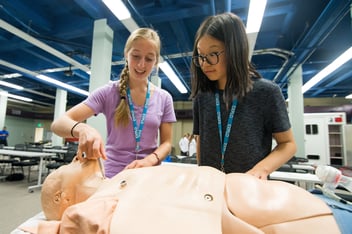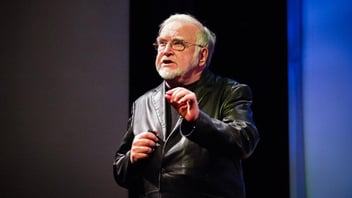Explo Alum Gives Timely Ted Talk

This entire experiment of American democracy depends on ongoing, meaningful debate.
Greg Cooper, TEDx Talk Speaker, U.S. history and government teacher, Explo faculty alum
Former Explo faculty member Greg Cooper, currently a U.S. history and government teacher at Ransom Everglades School in Coconut Grove, Florida, recently gave a powerful talk as a part of regional Ted Talks, located on the Ransom Everglades campus.

With a theme of innovation and reinvention, students and faculty from Ransom Everglades “challenged its audience to reconsider ‘Square One’” with TedxCoconutGrove. Cooper’s talk, “Magic Words: The Death of American Debate” focuses on how honest, important, meaningful debate has been “hijacked by rigid ideology,” or what Cooper calls “magic words; words so powerful they actually dupe us into thinking we’re actually talking about important things, when really we are just cutting off debate.”
What are “Magic Words?”
In Cooper’s definition, “Magic Words” are “a set of code words that cut off debate. Rather than acting as a starting point for a debate, they mutate it into words that stifle this dialogue. ‘Liberty,’ ‘equality,’ ‘justice,’ have all become pawns in a partisan chess match.”
We all agree that we want liberty, equality, fairness, democracy, responsibility, right? But can we agree on what these words mean? “It’s easy to believe in liberty when there’s no definition attached,” Cooper argues. But liberty means different things to different parties and to different people, and the problem is that all wield this magic word — and others — as a weapon, resulting in the end of productive conversation and progress. Cooper says, “if words like freedom and equality are going to feature prominently in our political dialogue, we need understand what we’re talking about.”
Back to Square One
Cooper remembers his first days as a new teacher, which coincided with the tragic attacks of September 11th. He recalls discarding all the lesson plans he crafted over the summer, responding instead to the state of the country, and the world, with “instinct, emotion, and a fundamental understanding of what it [means] to be a human, a teenager, and an American.”
Through the 9/11 tragedy and the enormous loss the country experienced, Cooper and his students, like all Americans, “faced a new normal.” They were “shocked out of complacency,” and talked openly about what it meant to grow up in this “new world, with safety and security no longer assumed.” Cooper continues, “We had to consider what we [mean] by American Freedom.”
Cooper argues that the events of September 11th pushed us back to square one in terms of meaningful debate. Certainly it caused a sharp return to nationalism, but it also brought on “impressive nonpartisanship.” Citizens were asked to think deeply about “what we mean by privacy, security, and civil rights.” These are conversations we should have been having all along, but we had become comfortable, locked in place.
And now, over a decade later, we’re in the same spot, making no progress as the dominant political parties, and their followers, continue to dig in their heels. Worse, people have stopped caring because they don’t see or hear any real conversation, which leaves them devoid of hope and apathetic about real progress. “We’ve gotten stuck — we retreat to the echo chamber of our living rooms, where Fox News and MSNBC confirm what we already knew (or think we know) and to the comfort of a predictable world.” People cling to their party’s definition of a magic word without stopping to consider alternate views in an extremely complex civilization. “It’s the equivalent, Cooper says, of “closing your eyes, plugging your ears,and drowning out your opponent by yelling, ‘I can’t hear you!’”
What Can We Do?
Cooper insists that we need to be willing to confront, and engage with, “the hard questions” to get unstuck. He describes the current political climate as one in which “really smart people are saying really simplistic things,” employing magic words that “stymie intelligent discourse that require thoughtful discussion to resolve.”
Watch It
Cooper’s talk has a compelling frankness that feels just right at this critical time in the world, when it seems that all of politics is consumed with hollow promises and personal attacks. These chameleon-like “magic words” that once represented our founding principles “have been co-opted, and used to represent what are really just entrenched partisan attitudes.” Cooper combines his honesty with an optimistic undercurrent and a clear commitment to engaging people — particularly his students — in authentic conversation about issues that matter. The talk is thoughtful, inspiring, and — with the right definition — hopeful.



